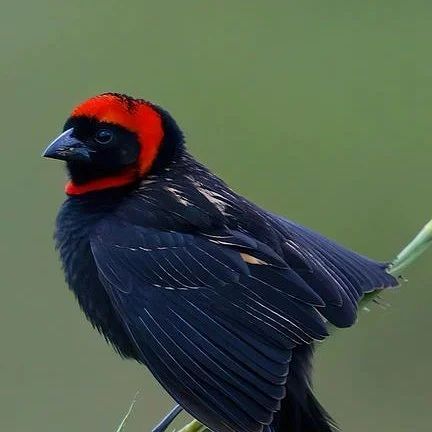On the open grasslands of eastern and southern Africa, when the rains return and the savanna bursts alive, one small bird transforms into a spectacle that seems too bold for its size. The Red-collared Widowbird, unremarkable for most of the year, becomes a living banner of fire and shadow when the breeding season begins.
Males undergo a dramatic change. Their plumage turns velvet-black, a sharp contrast to the blazing crimson collar that spreads across the throat and chest like molten embers. From their tails trail feathers so long they drag in the wind—ribbons of black that can reach more than half the bird’s body length. In flight, they are astonishing: a flash of scarlet, a streaming tail, a silhouette that seems impossibly weighted yet impossibly graceful.
This extravagant display is not for camouflage but for love. The longer the tail, the more likely a male is to attract a mate. It is a costly signal—heavy feathers make flight slower, harder, and more dangerous. Yet the females choose the most extravagant dancers, a living proof that beauty is born from survival against the odds.
The Red-collared Widowbird’s courtship is played out over grassland arenas. Males stake territories and perform looping flights, their tails unfurling like banners in the wind. Each swoop and glide is both invitation and declaration: here is strength, here is endurance, here is a mate worth choosing.
Outside of breeding season, the spectacle vanishes. The males molt, losing their scarlet collars and trailing plumes, returning to a modest, sparrow-like appearance. For most of the year, they blend back into the flocks, indistinguishable, waiting for the rains to summon their fire again.
The Red-collared Widowbird is a reminder that nature often writes its greatest dramas in the smallest characters. In a world where survival usually rewards concealment, this bird defies logic—choosing brilliance over safety, burden over ease. And in that defiance, it becomes unforgettable: a blaze of red and black, a banner of life itself, rippling across the African sky.
